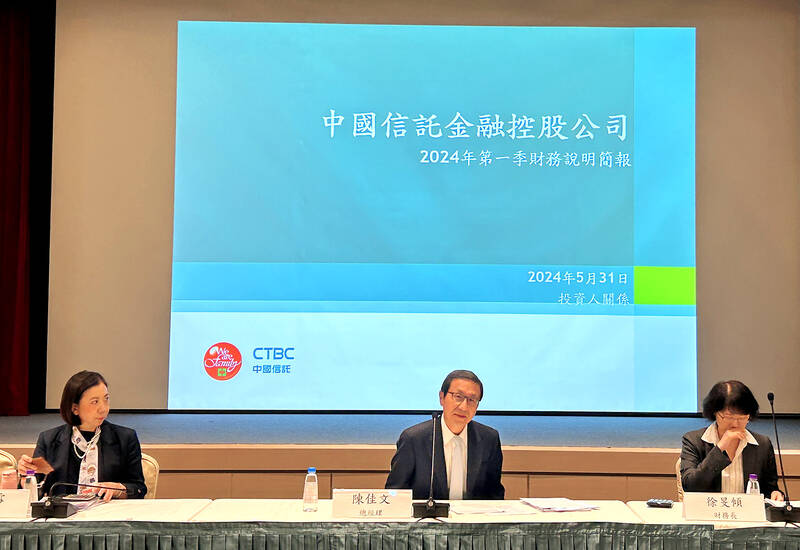CTBC Financial Holding Co (中信金) is looking to grow its profitability this year by double percentage points from last year on the back of an improvement in banking and life insurance operations.
CTBC Financial president James Chen (陳佳文) shared the positive guidance during an investors’ conference in Taipei, after first-quarter income spiked 61 percent year-on-year to NT$20.92 billion (US$645.28 million), or earnings of NT$1.07 per share.
“We’re cautiously optimistic that earnings this year would make record again so that the company can distribute higher cash dividends next year,” Chen said.

Photo: CNA
The conglomerate said it plans to issue NT$1.8 per share in cash dividends based on last year’s profit once the general shareholders’ meeting on June 14 gives the go-ahead.
Main subsidiary CTBC Bank (中國信託銀行) posted a net income of NT$12.1 billion in the January-to-March period, suggesting a 7 percent advance from a year earlier.
Banking operations were stable, but fee income from wealth management, credit card payment, corporate financing and trust management services swelled from 23 percent to 40 percent, Chen said.
Surges in the TAIEX lent support to wealth management, he said.
The local bourse’s pullback this week likely had to do with profit-taking pressures on the part of institutional investors, as the price-to-earnings ratio for local shares climbed to a relatively high level of 23, Chen said.
Overseas banking generated 35 percent of overall profit, with branches in Hong Kong, China and Japan seeing strong growth in general, he said.
Taiwan Life Insurance Co (台灣人壽) emerged as another main profit driver last quarter by realizing capital gains from its share holdings, although the diminishing chance of rate cuts by the US Federal Reserve weighs on its bond positions, Chen said.
The life insurer is poised to benefit from the dividend season between this month and August, when major listed Taiwanese firms distribute cash and stock dividends from the previous year’s earnings, he said.
The group’s securities and fund houses also recorded income growths of double percentage points, as Taiwanese investors aggressively raised stakes in exchange-traded funds and helped boost stock turnover, Chen said.
Chen also commented on the group’s alleged interest in acquiring Shin Kong Financial Holding Co (新光金) for the first time, saying that the two sides have not made any contact on the issue.
The group has a mergers and acquisitions (M&A) team that would make its move when opportunities arise, Chen said.
A big, healthy bank would be an ideal M&A target, as it would help CTBC Bank expand its market share, he said, adding that the bank has an 8 percent market share in Taiwan despite being the largest private-run lender.
CTBC Bank does not have enough local branches, which explains why customers at most branches have to wait more than 20 minutes to be served, Chen said, adding that M&A deals would provide a solution.
Increasingly more people are opting to transact online, but in-person services remain necessary for complicated banking activity, he said.

POWERING UP: PSUs for AI servers made up about 50% of Delta’s total server PSU revenue during the first three quarters of last year, the company said Power supply and electronic components maker Delta Electronics Inc (台達電) reported record-high revenue of NT$161.61 billion (US$5.11 billion) for last quarter and said it remains positive about this quarter. Last quarter’s figure was up 7.6 percent from the previous quarter and 41.51 percent higher than a year earlier, and largely in line with Yuanta Securities Investment Consulting Co’s (元大投顧) forecast of NT$160 billion. Delta’s annual revenue last year rose 31.76 percent year-on-year to NT$554.89 billion, also a record high for the company. Its strong performance reflected continued demand for high-performance power solutions and advanced liquid-cooling products used in artificial intelligence (AI) data centers,

SIZE MATTERS: TSMC started phasing out 8-inch wafer production last year, while Samsung is more aggressively retiring 8-inch capacity, TrendForce said Chipmakers are expected to raise prices of 8-inch wafers by up to 20 percent this year on concern over supply constraints as major contract chipmakers Taiwan Semiconductor Manufacturing Co (TSMC, 台積電) and Samsung Electronics Co gradually retire less advanced wafer capacity, TrendForce Corp (集邦科技) said yesterday. It is the first significant across-the-board price hike since a global semiconductor correction in 2023, the Taipei-based market researcher said in a report. Global 8-inch wafer capacity slid 0.3 percent year-on-year last year, although 8-inch wafer prices still hovered at relatively stable levels throughout the year, TrendForce said. The downward trend is expected to continue this year,

Vincent Wei led fellow Singaporean farmers around an empty Malaysian plot, laying out plans for a greenhouse and rows of leafy vegetables. What he pitched was not just space for crops, but a lifeline for growers struggling to make ends meet in a city-state with high prices and little vacant land. The future agriculture hub is part of a joint special economic zone launched last year by the two neighbors, expected to cost US$123 million and produce 10,000 tonnes of fresh produce annually. It is attracting Singaporean farmers with promises of cheaper land, labor and energy just over the border.

US actor Matthew McConaughey has filed recordings of his image and voice with US patent authorities to protect them from unauthorized usage by artificial intelligence (AI) platforms, a representative said earlier this week. Several video clips and audio recordings were registered by the commercial arm of the Just Keep Livin’ Foundation, a non-profit created by the Oscar-winning actor and his wife, Camila, according to the US Patent and Trademark Office database. Many artists are increasingly concerned about the uncontrolled use of their image via generative AI since the rollout of ChatGPT and other AI-powered tools. Several US states have adopted